De Nederlandse schrijver, essayist en criticus Frans Coenen werd in Amsterdam geboren op 24 april 1866. Zie ook alle tags voor Frans Coenen op dit blog.
Uit: Bezwaarlijke liefde
“Tusschen tafel en kanapee ging hij met gelijke vervelings passen op en neer, in vage benauwdheid.
De kamer was in schemering, maar in den eenen raamhoek scheen de lamp op zijn schrijftafel door de gekleurdpapieren kap een rooden gloed uit, en hij voelde, verstrooid er heenziende, daar een gezelligheidscentrum, in de lichtsfeer der lamp een hoekje saamgetrokken stilte-aandacht en als het uiterlijk aspect van een geestesstaat, die ernst en wegzijn uit de buitenwereld beduidde.
Maar hij ging in de gevoelige schemering naast de tafel, waarop nog het theegoed stond; pogend zijn verlangen te koelen in beweging, benauwd door de holheid van den tijd en de zwaarte van zijn lijfsbestaan.
Hoog uit het vage donkere, aan het penant tusschen de twee ramen, rusteloosde de bleeke tik van een oud porceleinen klokje, waarvan omlaag de gewichten stil koperglansden.
En er was een vermoeiend accent, telkens op de tweede tik, alsof de tijd mank ging. In zijn prikkelbare leegheid van zijn moest hij daar telkens op letten en die kreupele stap volgen door de stilte, verveeld-zenuwig-nieuwsgierig of het werkelijkheid of maar verbeelding was, dat de tweede tik zwaarder klonk.
Hij zag nog eens op naar de kleine ronde wijzerplaat, die vaag uit de wand bleekte en waar de grove stompe wijzers in de laagte de bekende scherpe hoek van halfnegen vormden.
Halfnegen pas… En hij moest tot minstens tien uur wachten…
De kamer stond om hem, leeg en onverschillig. Die intieme lichthoek met de aandachtschijn over het opgeslagen boek werd hem tot een ergernis, omdat het even smartelijk deed indenken in de zielerust en vruchtbare concentratie van een, die daar zou zitten, onbewust van alle uiterlijke dingen, de uren door.
Staande met de rug naar het smalle penant tusschen de ramen, zond hij vaagzoekende blikken uit in de schemerholle kamerruimte.
Bleek-vervig rezen de rechte, hoekende lijnen van de deur in de rechterhoek. Daarnaast de posten der hooge dubbeldeuren, die in ’t midden der kamer naar de alkoof openden. Die stonden nu open en flauw bleekten hun langwerpige vakken in de alkoofdonkerte, waar een lampet in zijn kom bleek opschimde aan de achterwand.”
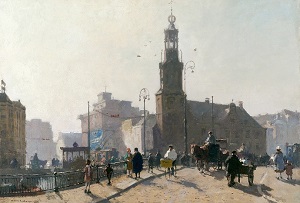
Frans Coenen (24 april 1866 – 23 juni 1936)
De Munt te Amsterdam door Cornelis Vreedenburgh, 1926.
De Amerikaanse schrijver en acteur Eric Bogosian werd geboren op 24 april 1953 in Woburn, Massachusetts. Zie ook alle tags voor Eric Bogosian op dit blog.
Uit: One Day in the Life of Ivan Denisovich
“Shukhov had been told that this old man’d been in camps and prisons more years than you could count and had never come under any amnesty. When one ten-year stretch was over they slapped on another. Shukhov took a good look at him close up. In the camp you could pick him out among all the men with their bent backs because he was straight as a ramrod. When he sat at the table it looked like he was sitting on something to raise himself up higher. There hadn’t been anything to shave off his head for a long time-he’d lost all his hair because of the good life. His eyes didn’t shift around the mess hall all the time to see what was going on, and he was staring over Shukhov’s head and looking at something nobody else could see. He ate his thin gruel with a worn old wooden spoon, and he took his time. He didn’t bend down low over the bowl like all the others did, but brought the spoon up to his mouth. He didn’t have a single tooth either top or bottom-he chewed the bread with his hard gums like they were teeth. His face was all worn-out but not like a goner’s-it was dark and looked like it had been hewed out of stone. And you could tell from his big rough hands with the dirt worked in them he hadn’t spent many of his long years doing any of the soft jobs. You could see his mind was set on one thing-never to give in. He didn’t put his eight ounces of bread in all the filth on the table like everybody else but laid it on a clean little piece of rag that’d been washed over and over again.”
(…)
“Shukhov stared at the ceiling and said nothing. He no longer knew whether he wanted to be free or not…it had gradually dawned on him that people like himself were not allowed to go home but were packed off into exile. And there was no knowing where the living was easier – here or there. The one thing he might want to ask God for was to let him go home. But they wouldn’t let him go home.”
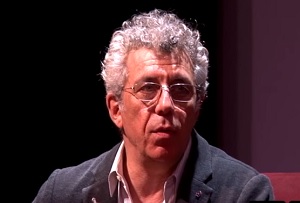
Eric Bogosian (Woburn, 24 april 1953)
De Amerikaanse dichter en schrijver Robert Penn Warren werd geboren op 24 april 1905 in Guthrie, Kentucky. Zie ook alle tags voor Robert Penn Warren op dit blog.
Lord Jesus, I wonder
Lord Jesus, I wonder if I would recognize you
On the corner of Broadway and Forty-Second-
Just one more glaze-eyed, yammering bum, nobody to listen
But the halt and maimed. My legs are good.
Yet sometimes I’ve thought of you, sandaled on sand,
Or stub-toed in gravel, dried blood black on a toe-nail,
And you seemed to look beyond traffic, then back with an innocent
Smile, to ask a revealing question
To which I could find no answer. But I suddenly smell
The sweat-putrid mob crowding closer, in pain and emptiness, ready
To believe anything-ignorant bastards. I envy them. Except
Their diseases, of course. For my head roars
With information, true or false, till I feel like weeping
At the garish idiocy of a Sunday School card. At fourteen,
I was arrogantly wrapped up in Darwin, but felt, sometimes,
Despair because I could not love God, nor even know his address.
How about this? God, c/o Heaven-Special Delivery? Well,
The letter was returned: Addressee Unknown. So
I laughed till I vomited. Then laughed again, this time
At the wonder of the world, from dawn to dark, and all
Night long, while stars spoke wisdom in battalions of brilliance.
Sometimes, since then, I have, face up, walked a night road,
Still adolescent enough to seek words for what was in my heart,
Or gut. But words, I at last decided, are their own truth.
There is no use to continue this conversation. We all
Know that. But, for God’s sake, look the next blind man you meet
Straight in the eye. Do not flinch at prune-shriveled socket, or
Blurred eyeball. Not that you have
The gift of healing. You will not heal him, but
You may do something to heal something within yourself.
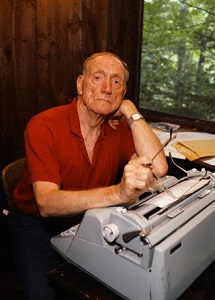
Robert Penn Warren (24 april 1905 – 15 september 1989)
De Amerikaanse dichter George Oppen (eig. George Oppenheimer) werd geboren op 24 april 1908 in New Rochelle, New York. Zie ook alle tags voor George Oppen op dit blog.
Populist
I dreamed myself of their people, I am of their people,
I thought they watched me that I watched them
that they
watched the sun and the clouds for the cities
are no longer mine image images
of existence (or song
of myself?) and the roads for the light
in the rear-view mirror is not
death but the light
of other lives tho if I stumble on a rock I speak
of rock if I am to say anything anything
if I am to tell of myself splendor
of the roads secrecy
of paths for a word like a glass
sphere encloses
the word opening
and opening
myself and I am sick
for a moment
with fear let the magic
infants speak we who have brought steel
and stone again
and again
into the cities in that word blind
word must speak
and speak the magic
infants’ speech driving
northward the populist
north slowly in the sunrise the lapping
of shallow
waters tongues
of the inlets glisten
like fur in the low tides all that
childhood envied the sounds
of the ocean
over the flatlands poems piers foolhardy
structures and the lives the ingenious
lives the winds
squall from the grazing
ranches’ wandering
fences young workmen’s
loneliness on the structures has touched
and touched the heavy tools tools
in our hands in the clamorous
country birth-
light savage
light of the landscape magic
page the magic
infants speak
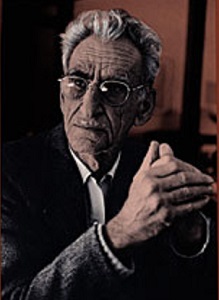
George Oppen (24 april 1908 – 7 juli 1984)
De Amerikaanse schrijfster Sue Grafton werd geboren in Louisville (Kentucky) op 24 april 1940 als dochter van schrijver C.W. Grafton en Vivian Harnsberger. Zie ook alle tags voor Sue Grafton op dit blog.
Uit: W Is For Wasted
“Two dead men changed the course of my life that fall. One of them I knew and the other I’d never laid eyes on until I saw him in the morgue. The first was Pete Wolinsky, an unscrupulous private detective I’d met years before through Byrd-Shine Investigations, where I’d served my apprenticeship. I worked for Ben Byrd and Morley Shine for three years, amassing the six thousand hours I needed for my license. The two were old-school private eyes, hard-working, tireless, and inventive. While Ben and Morley did business with Pete on occasion, they didn’t think much of him. He was morally shabby, disorganized, and irresponsible with money. In addition, he was constantly pestering them for work, since his marketing skills were minimal and his reputation too dubious to recommend him without an outside push.
Byrd-Shine might subcontract the odd stretch of surveillance to him or assign him a routine records search, but his name never appeared on a client report. This didn’t prevent him from stopping by the office without invitation or dropping their names in casual conversations with attorneys, implying a close professional relationship. Pete was a man who cut corners and he assumed his colleagues did likewise.
More problematic was the fact that he’d rationalized his bad behavior for so long it had become standard operating procedure.
Pete Wolinsky was gunned down the night of August 25 on a dark stretch of pavement just off the parking lot at the Santa Teresa Bird Refuge. The site was right across the street from the Caliente Café, a popular hangout for off-duty cops. It might seem odd that no one in the bar was aware that shots were fired, but the volume on the jukebox, roughly the equivalent of a gas-powered chainsaw at a distance of three feet. The rare moments of quiet are masked by the high-pitched rattle of ice cubes in dueling blenders where margaritas are whipped up at a rate of one every four and a half minutes.
Pete’s body might not have been discovered until daylight if it hadn’t been for an inebriated bar patron who stepped into the shadows to take a leak. I heard about Pete’s death on the morning news while I was eating my Cheerios. The TV set was on in the living room behind me, more for the company than the content.”
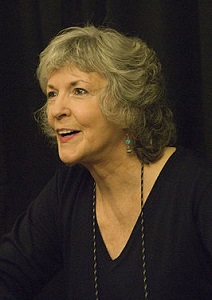
Sue Grafton (24 april 1940 – 28 december 2017)
De Zwitser dichter, schrijver, essayist en criticus Carl Friedrich Georg Spitteler (eig. Carl Felix Tandem) werd geboren op 24 april 1845 in Liestal bij Basel. Zie ook alle tags voor Carl Spitteler op dit blog.
Es kam ein Herz an einem Jahrestage
Es kam ein Herz an einem Jahrestage
Vor seinen Herrn, zu weinen diese Klage:
“So muß ich Jahr für Jahr denn mehr verarmen!
Kein Gruß, kein Brieflein heute zum Erwarmen!
Ich brauch ein Tröpflein Lieb, ein Sönnchen Huld.
Ist mein der Fehler? ists der andern Schuld?
Hab jede Güte doch mit Dank erfaßt
Und auf die Dauer niemand je gehaßt.
Noch ist kein Trauriger zu mir gekommen,
Der nicht ein freundlich Wort von mir vernommen.
Wer weiß es besser, wie man Gift vergibt?
Wer hat in Strömen so wie ich geliebt?
Doch dieses eben schmeckt so grausam schnöde:
Da, wo ich liebte, grinst die leerste Öde.”
An seinem Schreibtisch waltete der Herr,
Schaute nicht auf und sprach von ungefähr:
“Ein jeder wandle einfach seine Bahn.
Ob öd, ob schnöde, ei was gehts dich an?
Was tut das Feuer in der Not? Es sprüht.
Was tut der Baum, den man vergißt? Er blüht.
Drum übe jeder, wie er immer tut.
Wasch deine Augen, schweig und bleibe gut.”
Die Sängerin
Im Traume wars. Ein Pilgerschwarm
Von Männern und von Frauen zog
Durch meine Heimat Hand in Hand,
Lobsingend einen süßen Psalm.
Im letzten Gliede schreitend folgt
ch selig der verwandten Schar.
Da schwang durch den harmonischen Chor,
Vom Haupt des Zuges, unsichtbar
sich eine Stimme jung und frisch
Und klar, weithin Gebirg und Tal
Vergoldend mit dem sonnigen Sang.
Allein die Stimme jauchzte falsch,
Im Tone hinkend und im Takt.
Und ob dem wundersamen Sang
So schön, so innig und so falsch,
Warf ich mich schluchzend auf den Weg,
Die Zähne klemmend in die Faust,
Die Stirn im heimatlichen Staub.
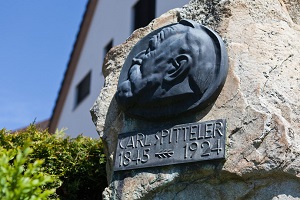
Carl Spitteler (24 april 1845 – 29 december 1924)
Monument in Bennwil
De Engelse schrijver Anthony Trollope werd geboren in Londen op 24 april 1815. Zie ook alle tags voor Anthony Trollope op dit blog.
Uit: The Duke’s Children
“No one, probably, ever felt himself to be more alone in the world than our old friend, the Duke of Omnium, when the Duchess died. When this sad event happened he had ceased to be Prime Minister. During the first nine months after he had left office he and the Duchess remained in England. Then they had gone abroad, taking with them their three children. The eldest, Lord Silverbridge, had been at Oxford, but had had his career there cut short by some more than ordinary youthful folly, which had induced his father to agree with the college authorities that his name had better be taken off the college books,–all which had been cause of very great sorrow to the Duke. The other boy was to go to Cambridge; but his father had thought it well to give him a twelvemonth’s run on the Continent, under his own inspection. Lady Mary, the only daughter, was the youngest of the family, and she also had been with them on the Continent. They remained the full year abroad, travelling with a large accompaniment of tutors, lady’s-maids, couriers, and sometimes friends. I do not know that the Duchess or the Duke had enjoyed it much; but the young people had seen something of foreign courts and much of foreign scenery, and had perhaps perfected their French. The Duke had gone to work at his travels with a full determination to create for himself occupation out of a new kind of life. He had studied Dante, and had striven to arouse himself to ecstatic joy amidst the loveliness of the Italian lakes. But through it all he had been aware that he had failed. The Duchess had made no such resolution,–had hardly, perhaps, made any attempt; but, in truth, they had both sighed to be back among the war-trumpets. They had both suffered much among the trumpets, and yet they longed to return. He told himself from day to day, that though he had been banished from the House of Commons, still, as a peer, he had a seat in Parliament, and that, though he was no longer a minister, still he might be useful as a legislator. She, in her career as a leader of fashion, had no doubt met with some trouble,–with some trouble but with no disgrace; and as she had been carried about among the lakes and mountains, among the pictures and statues, among the counts and countesses, she had often felt that there was no happiness except in that dominion which circumstances had enabled her to achieve once, and might enable her to achieve again–in the realms of London society.”
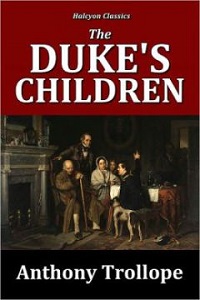
Anthony Trollope (24 april 1815 – 6 december 1882)
Cover
De Duitse schrijver Michael Schaefer werd geboren op 24 april 1976 in Bielefeld. Zie ook alle tags voor Michael Schaefer op dit blog.
Uit: Liebe auf Raten
„Die letzte Nacht schlief er höchstens zwei Stunden. Er war viel zu aufgeregt und checkte mindestens zwanzig Mal in der Nacht sein gesamtes Gepäck und seine Geldbörse, ob er auch alles hatte. Den Stadtführer, die Stadtkarte, die Metro-Karte, die er sich extra von seiner Klassenlehrerin bestellen ließ, damit er ohne Probleme in London umherfahren konnte, um alles anzusehen, was es dort gab. Er wechselte auch mindestens dreimal sein gesamtes Gepäck, um optimal auf alle ‘Wetterverhältnisse in London ausgerüstet zu sein. Am nächsten Morgen war er als erster am Frühstückstisch, fix und fertig zur Abreise nach London. Er hatte sogar seinen Eltern das Frühstück gemacht, so dass weniger Zeit verloren ging, um loszufahren. An der Schule von Silverville stand bereits der große Reisebus, um die wild durcheinander schreienden Jugendlichen aufzunehmen und sie gen London zu bringen. Er hielt sich nicht lange mit der Verabschiedung seiner Eltern auf. Er umarmte beide kurz und ließ sich seine goldblonden Locken noch etwas zurechtzupfen und seine Jacke etwas fester um seine Schulter ziehen. Dann verstaute er sein Gepäck in dem Lagerraum des Busses und stieg ein, ohne sich noch einmal umzublicken. Tom erwartete ihn bereits etwa in der Mitte des Busses, ganz in der Nähe der Toilette. Man weiß ja nie, wie sehr so ein Bus rütteln kann. Und da weder Tom noch Steve jemals eine solch lange Fahrt mit dem Bus gemacht hatten, konnte man nicht vorsichtig genug sein. Seine Klassenlehrerin und ihr Vertretungslehrer zählten durch und dann konnte die Fahrt endlich beginnen. Zwei Stunden und mindestens dreißig Minuten Busfahrt ohne Pause, Tom und Steve hielten sich beide nicht großartig lang an Gesprächen auf, sondern blickten voller Erwartung aus dem Fenster. Sie ließen Orte, Wiesen, Landstrassen und zum Ende auch die Autobahn hinter sich.
Nach zwei Stunden und 44 Minuten erreichten sie die ersten Außenbezirke von London. Die Jugendlichen drückten sich ihre Nasen an der Scheibe platt und staunten nicht schlecht über diese vielen Menschen, die eilig durch das typische Londoner Regenwetter eilten, um schnell nach Hause oder zum Arbeitsplatz, zum Supermarkt oder zum Bäcker zu kommen. Je näher man dem Stadtkern kam, umso voller wurde es und umso gewaltiger waren die Häuser. Mietswohnungen mit vier Stockwerken waren für die Landjungs schon fast Wolkenkratzer. Jedes Bankgebäude mit seinen metallenen Fassaden oder Glaswänden war Utopie. Die berühmten roten Doppeldecker des Londoner Stadtbildes entlockte dem einen oder anderen ein erstauntes „Boah”.

Michael Schaefer (Bielefeld, 24 april 1976)
London Under Rain door Yetis Uysal
De Australische schrijver Marcus Clarke werd geboren op 24 april 1846 in Londen. Zie ook alle tags voor Marcus Clarke op dit blog.
Uit: Australian Tales of the Bush
“She rides like an angel,said pious Fitz, and the next time he met her he told her so.
Now this young maiden, so fair, so daring, and so silent, came upon the Bullocktown folk like a new revelation. The old Frenchman at the Melon Patch vowed tearfully that she had talked French to him like one of his countrywomen, and the school master, Mr. Frank Smith, duly certificated under the Board of Education, reported that she played the piano divinely, singing like a seraph the while. As nobody played (except at euchre) in Bullocktown, this judgment was undisputed. Coppinger swore, slapping with emphasis his mighty thigh, that Miss Jane was a lady, and when he said that he said everything. So, whenever Miss Jane visited the township, she was received with admiration. Coppinger took off his hat to her, Mr. Frank Smith walked to the station every Sunday afternoon to see her, and Poor Joe stood afar off and worshipped her, happy if she bestowed a smile upon him once out of every five times that he held her tiny stirrups.
This taming of Poor Joe was not unnoticed by the whisky-drinkers, and they came in the course of a month or so to regard the cripple as part of the property of Miss Jane, as they regarded her dog for instance. The schoolmaster, moreover, did not escape tap-room comment. He was frequently at Seven Creeks. He brought flowers from the garden there. He sent for some new clothes from Melbourne. He even borrowed Coppinger ’s bay mare. Flirt,to ride over to the Sheep-wash, and Dick the mail-boy, who knew that Coppinger ’s mare was pigeon-toed, vowed that he had seen another horses tracks besides hers in the sand of the Rose Gap Road.
You’re a deep un, Mr. Smith, said Coppinger. I found yer out sparking Miss Jane along the Mountain Track. Deny it if yer can?
But Frank Smith ’s pale cheek only flushed, and he turned off the question with a laugh. It was Poor Joe ’s eyes that snapped fire in the corner.
So matters held themselves until the winter, when the unusually wet season forbade riding parties of pleasure. It rained savagely that year, as we all remember, and Bullocktown in rainy weather is not a cheerful place. Miss Jane kept at home, and Poor Joe ’s little eyes, wistfully turned to the Station on the hill, saw never her black pony cantering round the corner of Archie Camerons hayrick.“
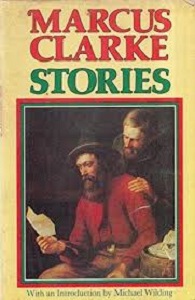
Marcus Clarke (24 april 1846 – 2 augustus 1881)
Cover
Zie voor nog meer schrijvers van de 24e april ook mijn blog van 24 april 2016 deel 2.
